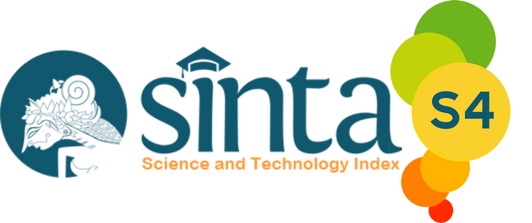Pengaruh Modal Sosial dan Kelembagaan terhadap Kinerja Usaha Tani Kapulaga di Lahan Perhutani Kabupaten Banyumas
Abstract
Central Java is the second largest cardamom-producing province in Indonesia, with a total cardamom production of 9,814.4 kg in 2020. However, cardamom cultivation by farmers is less effective and is left without processing after harvesting. Such conditions cause cardamom yields to be not optimal in terms of quality and quantity. Institutions that run well are also predicted to be able to improve farm performance. The purpose of this research is to find out: (1) the characteristics of social and institutional capital of cardamom farmers in the perhutani land in Banyumas Regency; (2) the direct influence of social and institutional capital on the performance of cardamom farmers' farming in perhutani lands in Banyumas Regency; and (3) knowing whether the institutional variable is a moderating variable in the direct relationship between social capital and the performance of cardamom farming in perhutani land, Banyumas Regency. Data analysis was carried out by calculating productivity, profit, and feasibility to estimate the performance of cardamom farming in the forest area of Banyumas Regency. To determine whether social and institutional capital affects the performance of cardamom farming in perhutani land, Banyumas Regency, measured using Structural equation modeling (SEM) analysis. The results showed that the characteristics of social and institutional capital in the research location, on average, had a high category. Cardamom farming has been profitable and feasible to be developed. SEM-PLS analysis shows that the most dominant indicator measuring social capital is trust, while the most prevalent indicator measuring institutional is cultural values. Furthermore, social and institutional capital directly affect the performance of cardamom farming, but institutions cannot be a moderating variable of the social capital variable on farming performance.
Keywords
Full Text:
PDFReferences
Badan Pusat Statistik. (2020). Statistik pertumbuhan ekonomi iIndonesia triwulan I-2020. Tersedia dari https://www.bps.go.id/pressrelese/2020/02/05/1755/ekonomi-indonesia-2019-tumbuh-5-02-persen.html
Bulu, Y. G., Puspadi, K., & Praptomo, D. (2013). Model pengembangan pertanian perdesaan melalui inovasi (m-P3MI) berbasis agribisnis pertanian di Nusa Tenggara Barat. Mataram: Balai Pengkajian Teknologi Pertanian NTB. Tersedia dari http://ntb.litbang.pertanian.go.id/pu/m-P3MI/m-P3MI.pdf
Chasanah, N., & Sucipto, A. (2019). Liquidity ratio, profitability, and solvency on stock returns with capital structure as an intervening variable (Study on food and beverage sub sector listed in Indonesia stock exchange (Idx) Period 2013-2017). Ekspektra : Jurnal Bisnis dan Manajemen, 3(1): 52–68. https://doi.org/10.25139/ekt.v3i1.1476
Cofre-Bravo, G., Klerkx, L., & Engler, A. (2019). Combinations of bonding, bridging, and linking social capital for farm innovation: How farmers configure different support networks. Journal of Rural Studies, 69: 53–64. https://doi.org/10.1016/j.jrurstud.2019.04.004
Ernanda, R. (2018). Pengaruh modal sosial terhadap kinerja usaha tani cabai kopay di Kota Payakumbuh. Bogor: Bogor Agricultural University (IPB). Tersedia dari https://repository.ipb.ac.id/handle/123456789/95870
Ferdinand, A. (2002). Structural equation modeling in management research. Semarang: Fakultas Ekonomi UNDIP. Tersedia dari https://scholar.google.com/scholar?hl=id&as_sdt=0%2C5&q=Structural+equation+modeling+Ferdinand+2002&btnG=
Fukuyama, F. (2000). Social capital and civil society. In IMF working papers No. 00/74. https://doi.org/10.5089/9781451849585.001
Ghozali, I., & Latan, H. (2015). Konsep, teknik, aplikasi menggunakan Smart PLS 3.0 untuk penelitian empiris. Semarang: Badan Penerbit Universitas Diponegoro. Tersedia dari https://scholar.google.co.id/scholar?hl=id&as_sdt=0%2C5&q=Konsep%2C+teknik%2C+aplikasi+menggunakan+Smart+PLS+3.0+untuk+penelitian+empiris&btnG=
Ghozali, I., & Latan, H. (2015). Partial least squares konsep, teknik dan aplikasi menggunakan program smartpls 3.0 untuk penelitian empiris. Semarang: Badan Penerbit UNDIP. Tersedia dari https://scholar.google.co.id/scholar?hl=id&as_sdt=0%2C5&q=Partial+Least+Squares%2C+Konsep%2C+Teknik%2C+dan+Aplikasi+Menggunakan+Program+SmartPLS+3.2.9+untuk+peneliti&btnG=
Häuberer, J. (2011). Social capital theory (p. 330). Berlin: Springer Fachmedien. https://doi.org/10.1007/978-3-531-92646-9
Indraningsih, K. S. (2010). Penyuluhan pada petani lahan marjinal: Kasus adopsi inovasi usahatani terpadu lahan kering di Kabupaten Cianjur dan Kabupaten Garut Provinsi Jawa Barat (Disertasi). Bogor: Institut Pertanian Bogor. Tersedia dari https://scholar.google.com/scholar?hl=id&as_sdt=0%2C5&q=Penyuluhan+pada+petani+lahan+marjinal%3A+k+asus+adopsi+inovasi+usaha+tani+terpadu+lahan+kering+di+Kabupaten+Cianjur+dan+Kabupaten+Garut+Provinsi+Jawa+Barat&btnG=
Jayanti, M. D., & Waridin, W. (2019). Keterkaitan antar modal sosial dengan produktivitas pada usahatani semangka (Kasus: Kecamatan Wirosari, Kabupaten Grobogan). Doctoral dissertation. Semarang: Universitas Diponegoro. Tersedia dari https://core.ac.uk/download/pdf/231789475.pdf
Lumentut, M. D., & Dotulong, L. O. (2015). Pengaruh motivasi, disiplin, dan lingkungan kerja terhadap kepuasan kerja karyawan pada PT. Bank Sulut Cabang Airmadidi. Jurnal EMBA: Jurnal Riset Ekonomi, Manajemen, Bisnis dan Akuntansi, 3(1): 74–85. Tersedia dari https://ejournal.unsrat.ac.id/index.php/emba/article/view/6573
Sihaloho, T., Muna, N., Purbathin Hadi, A., Giyarsih, S. R., Damuri R. Y, Christian, D, and Atje, R., & Anantanyu, S. (2015). Kelembagaan petani : Peran dan strategi pengembangan kapasitasnya. Pusat Pengembangan Masyarakat Agrikarya, 2(2): 75–101. Tersedia dari http://jurnal.uii.ac.id/index.php/JSTL/article/view/3586/3176
Sumarlan, S., Tjitropranoto, P., & Gani, D. S. (2012). Peningkatan kinerja petani sekitar hutan dalam penerapan sistem agroforestri di Pegunungan Kendeng Pati. Jurnal Agro Ekonomi, 30(1): 25–39. Tersedia dari http://repository.pertanian.go.id/handle/123456789/161
Suryadi, T., & Mulyaningtiyas, R. D. (2016). Analisis faktor sosial ekonomi yang mempengaruhi pengembangan kelembagaan kelompok tani perempuan dalam pemanfaatan lahan pekarangan sekitar rumah di kabupaten kediri (Studi kasus pada kelompok tani perempuan desa nambakan, kecamatan ringinrejo kabupaten. Seminar Nasional Pertanian Peternakan Terpadu, 1(01): 438–461. Tersedia dari http://eproceedings.umpwr.ac.id/index.php/pertanian/article/view/219
Triana, D., & Oktavianto, W. O. (2013). Relevansi kualifikasi kontraktor bidang teknik sipil terhadap kualitas pekerjaan proyek konstruksi di Provinsi Banten. Jurnal Fondasi, 2(2): 182–190. http://dx.doi.org/10.36055/jft.v2i2.1732
Wuysang, R. (2014). Modal sosial kelompok tani dalam meningkatkan pendapatan keluarga suatu studi dalam pengembangan usaha kelompok tani di Desa Tincep Kecamatan Sonder. Acta Diurna Komunikasi, 3(3). Tersedia dari https://ejournal.unsrat.ac.id/index.php/actadiurnakomunikasi/article/view/5637
Yumi, Y., Sumardjo, S., Gani, D. S., & Sugihen, B. G. (2011). Model pengembangan pembelajaran petani dalam pengelolaan hutan rakyat lestari: Kasus di Kabupaten Gunung Kidul, Provinsi Daerah Istimewa Yogyakarta dan Kabupaten Wonogiri, Provinsi Jawa Tengah. Jurnal Penelitian Sosial dan Ekonomi Kehutanan, 8(3): 196–210. https://doi.org/10.20886/jpsek.2011.8.3.196-210
Yunus, S., Zainal, S., Jalil, F., & Sari, C. M. A. (2020). Correlation of social capital and poverty farmers in Aceh. Humanities & Social Sciences Reviews, 8(1): 20–26. https://doi.org/https://doi.org/10.18510/hssr.2020.813
Refbacks
- There are currently no refbacks.






